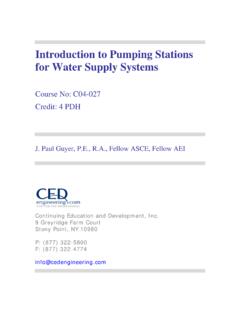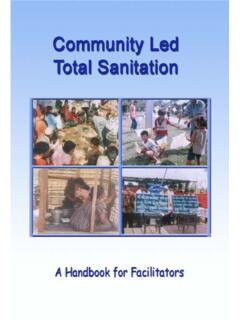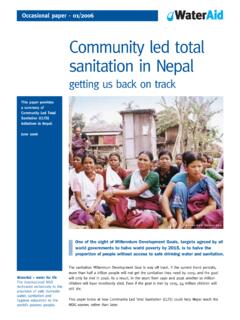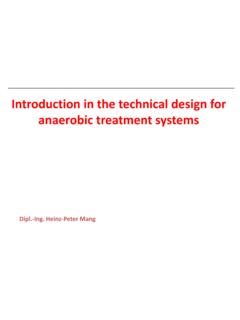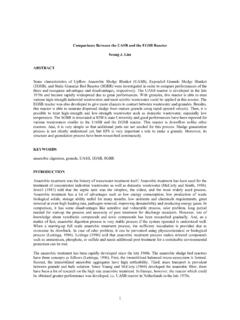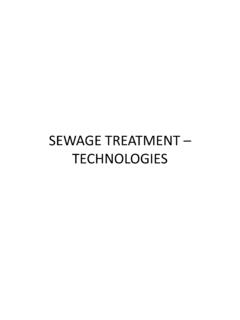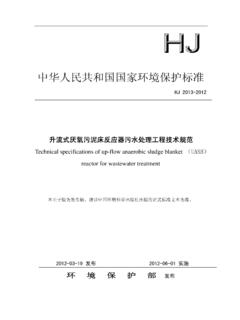Transcription of Decentralised Wastewater Treatment Systems (DEWATS) …
1 Bremen Overseas Research and Development AssociationDecentralised Wastewater Treatment Systems ( dewats ) and Sanitation in Developing CountriesA Practical GuideEditors: Andreas Ulrich, Stefan Reuter and Bernd GuttererAuthors: Bernd Gutterer, Ludwig Sasse, Thilo Panzerbieter and Thorsten Reckerz gelWater, Engineering and Development CentreDesigned and produced byPublished byPhone: +49 (0) 421 137 18 Fax: +49 (0) 421 165 53 23 E-mail: +44 (0) 15 09 22 28 85 Fax: +44 (0) 15 09 21 10 79 Email: Decentralised Wastewater Treatment Systems ( dewats ) and Sanitation in Developing CountriesDecentralised Wastewater Treatment Systems ( dewats ) and Sanitation in Developing CountriesA Practical GuideEditors: Andreas Ulrich, Stefan Reuter and Bernd GuttererAuthors: Bernd Gutterer, Ludwig Sasse, Thilo Panzerbieter and Thorsten Reckerz gelAll rights part of this publication may be reproduced, stored in a retrieval system ,or transmitted in any form or by any means, electronical, mechanical,photocopying, recording or , A.
2 , Reuter, S. and Gutterer, B. (eds) with Sasse, L., Panzerbieter, T. and Reckerz gel, T. (contributors)WEDC, Loughborough University, UK in association with BORDA, Germany (2009)Please note that views expressed in this publication are not necessarilythose of WEDC, Loughborough of the publication are: Andreas Ulrich (BORDA Director) Stefan Reuter (BORDA Vice Director) Bernd Gutterer (PhD, International Consultant)Authors of the publication are: Bernd Gutterer (PhD): Chapters 1 7 Ludwig Sasse: Chapters 7 10, Sections Thilo Panzerbieter Sections (Section in collaboration with Andreas Schmidt) Thorsten Reckerz gl has provided substantial documentation.
3 Editorial contributions: Mary Breen and Michael SmithAcknowledgementsThis publication is a collective effort. Since the early 1990s BORDA has collaborated with a multitude of individuals and institutions throughout Europe and Asia to develop the dewats approach. The first dewats Handbook was published by Ludwig Sasse in 1998. It served as an instruction manual focusing on the technical design. A wealth of experience in demand-oriented technology adaptation and dissemination has evolved since then, including public health and community-based sanitation. This book presents the collaborative efforts made by a wide range of professionals from local and central authorities, from private businesses and international donors, NGOs, community-based organisations and academia.
4 Therefore, this publication could not have been realised without the generous contribution of the many individuals and organisations who shared their experience and expertise. In particular the editors would like to express their gratitude to following partner organisations and individuals: Indonesia: LPTP (Surakarta); BEST (Tangerang); BaliFokus (Denpasar) India: Consortium for dewats Dissemination Society (CDD, Bangalore) and the associated partner network China: Sustainable Development Strategy Institute (SDSI) at Zhejiang University of Technology (ZUT), Hangzhou BORDA's Regional Programme Co-ordinators Frank Fladerer (BORDA South-East Asia), Pedro Kraemer (BORDA South-Asia) and Andreas Schmidt (BORDA Southern Africa) Prof.
5 Chris Buckley (Pollution Research Group, University of KwaZulu-Natal, South Africa) and Ludwig Sasse (retired, pioneer of BORDA's Biogas and dewats solutions)5 ISBN: 978 1 84380 128 3 BORDA, 2009 Designed and produced by Bremen Overseas Research and Development Association (BORDA), GermanyPhone: +49 (0) 421 137 18 Fax: +49 (0) 421 165 53 23 E-mail: by the Water, Engineering and Development Centre (WEDC), Loughborough University, UKPostal address: WEDC, The John Pickford Building, Loughborough University, Leicestershire, LE11 3TU, UKPhone: +44 (0) 15 09 22 28 85 Fax: +44 (0) 15 09 21 10 79 Email: is one of the world s leading education and research institutes forfor developing knowledge and capacity in water and sanitation for low- and middle-income countries.
6 Education and training programmes at postgraduate-level include Water and Waste Engineering and Water and Enviromental Management. WEDC research and consultancy is directed towards the study of aspects of infrastructure and services (especially related to water and sanitation) in low- and middle-income was founded in 1977 in Bremen Germany as a non-profit professional organisation with the goal of developing new methods of using renewable energy to alleviate poverty and, through the implementation of development pro-grammes, to improve the living conditions and social structures in disad vantaged communities other organisations, in the struggle against poverty BORDA focuses on the facilitation of basic needs services in the sectors of water, Wastewater , solid waste and energy.
7 To achieve this, partner structures, with the participation of all stakeholders, are advised and assisted in the stablishment and organisation of innovative basic needs services (BNS); this occurs during all phases of planning and construction up to the stages of operation and Mainstreaming dewats strategic planning and implementation of sustainable infrastructure Strategic planning of sanitation programmes Legal framework and efficient law enforcement Target-oriented local and municipal planning Features of urban infrastructure development Sanitation mapping as a tool for efficient urban-infrastructure development Financial analysis Comparative cost analysis for infrastructure development Economic analysis in times of global warming and energy scarcity Economic considerations for
8 Point-source polluters Parameters for economic calculation Sustainable financing schemes for sanitation programmes multi-source financing and willingness to pay 885 CBS programme planning and implementation Stakeholders in CBS programmes Responding to basic needs active involvement of beneficiaries and residents Local government and municipality bodies Non-governmental organisations Private sector 996 CBS Programme detailed procedure for implementation First planning activities The pilot project Preparation phase Kick-off workshop Planning workshop Community pre-selection and community assessment Planning phase Site assessment Informed technology choice Detailed engineering design Economic planning Agreement on implementation and landholding 117 TABLE OF CONTENTS1 Introduction 122 Towards comprehensive Wastewater and sanitation strategies World water resources under threat The protection of water resources achievements and challenges A short assessment of the sanitation and Wastewater sectors in developing countries Signs of change elements of efficient and sustainable sanitation programmes Towards service orientation the conceptual framework of basic needs sanitation
9 Programmes The increasing demand for efficient and reliable Decentralised Wastewater - Treatment solutions 313 dewats Sustainable Treatment of Wastewater at the local level dewats a modular system approach to ensure efficient Wastewater Treatment performance dewats a brief insight into technical configuration dewats good practice examples/applications dewats /CBS Community-Based Sanitation programmein Alam Jaya, Tangerang, Java, Indonesia dewats /CBS Community-Based Sanitation programme in Ullalu Upanagara, Bangalore, India dewats at public institutions Sino-German College of Technology, Shanghai, China dewats at public institutions Aravind Eye Hospital in Thavalakuppam, Pondicherry, India dewats /SME-Cluster approach Kelempok Mekarsari Jaya small-scale industry cluster, Denpasar, Bali, Indonesia dewats /SME Alternative Food Process Private Ltd.
10 Bangalore, Karnataka, India Infrastructural development in rural China Longtan Village, Danleng County, Szechuan Province, China dewats in integrated municipal planning Wenzhou University, Zheijang Province, China Planted soil filters Horizontal gravel filter Vertical sand filter Ponds Anaerobic ponds Aerobic ponds Hybrid and combined Systems Non- dewats technologies UASB Trickling filter Aquatic-plant Systems 22810 Designing dewats Technical spreadsheets background Usefulness of computer calculation Risks of using simplified formulas About the spreadsheets Technical spreadsheets application Assumed COD/BOD ratio Domestic Wastewater quantity and quality Septic tank Fully mixed digester Imhoff tank Anaerobic baffled reactor Anaerobic filter Horizontal



